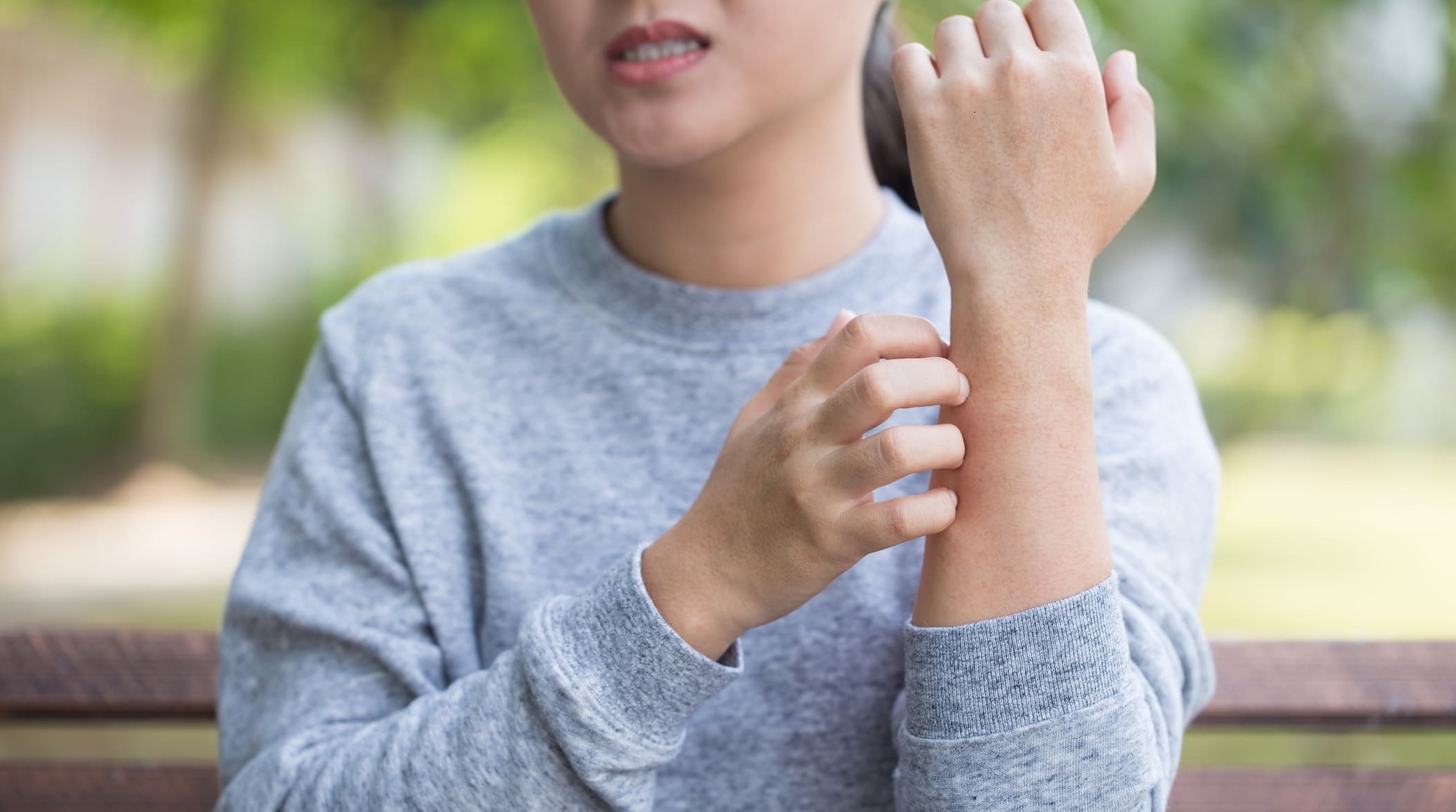
Medically Reviewed by Dr. Lee Hwee Chyen
MBBS MRCP (UK) FAMS (Dermatology)

Eczema affects individuals worldwide and can significantly impact daily life. It is characterised by skin inflammation, leading to itching, redness, and often discomfort. In this article, we’ll explore the common triggers for eczema flare-ups, and strategies and treatments that may help manage these flare-ups.
Eczema, or atopic dermatitis, is a general term for several types of skin inflammation. It comes in various forms, each with its unique features:
Allergens are substances that can cause a reaction in people who are sensitive to them. These can trigger an immune response in individuals with eczema, resulting in symptom flare-ups. Common allergens include:
Irritants are substances that can cause inflammation of the skin upon contact. These substances can worsen existing eczema or potentially even cause a new flare-up. They can be found in everyday products such as:
The weather can also affect eczema:
While not a direct cause of eczema, emotional stress can trigger a flare-up in some people. The exact relationship between stress and eczema is not entirely understood, but it’s believed that stress can worsen the body’s inflammatory response, leading to a flare-up.
Infections, whether bacterial, viral, or fungal, can cause an eczema flare-up:

The skin barrier can be compromised in eczema, causing it to lose moisture faster than normal. A fragrance-free moisturiser helps seal moisture and maintain barrier function, thereby keeping the skin hydrated and reducing dryness and itching. Moisturisers should be applied multiple times a day, especially after bathing.
Many commercial soaps and body washes contain chemicals and fragrances that can strip away natural oils from the skin’s surface, causing it to dry out and exacerbate eczema symptoms.
Opting for gentle, fragrance-free soaps or non-soap cleansers can help avoid this irritation. Non-soap cleansers are often pH balanced to the skin, which helps maintain the skin’s natural barrier.
While taking a long, hot shower or bath may be tempting, doing so can dehydrate the skin or damage the skin barrier. Instead, opt for shorter showers or baths using lukewarm water. This practice will help preserve the skin’s natural oils and maintain its hydration levels.
Vigorous rubbing with a towel after a shower or bath can irritate, potentially leading to an eczema flare-up. Instead, gently pat the skin dry with a soft towel. This method is less likely to aggravate the skin or cause damage.
Several lifestyle modifications can also help manage eczema:

Some people may find that specific foods trigger their eczema. Identifying and avoiding these can be beneficial. Ideally, this should be done under a dermatologist’s guidance to ensure the specific foods to avoid and include while remaining balanced.
Emotional stress can contribute to eczema flare-ups. Employing stress management techniques such as mindfulness, meditation, and yoga can help manage stress levels, potentially reducing the frequency and severity of flare-ups.
Soft, breathable materials such as cotton can help prevent skin irritation. In contrast, synthetic fabrics or wool can cause overheating and irritate the skin, leading to a potential flare-up.
Topical corticosteroids are anti-inflammatory medications available in various strengths. They are prescribed based on the severity and location of eczema, with stronger preparations typically used for short-term treatment of severe flare-ups and milder ones for maintenance therapy or sensitive areas like the face.
Calcineurin inhibitors, such as tacrolimus and pimecrolimus, are non-steroid topical medications that reduce inflammation by suppressing the immune system. They are typically used when other treatments have not been effective or are unsuitable, such as for long-term maintenance therapy or areas where skin thinning might be a concern with topical steroids.
Biologics are a relatively new treatment option for severe eczema. These medications, like Dupilumab, are injected and work by targeting specific parts of the immune system that contribute to the inflammation seen in eczema.
Eczema, while a chronic condition, can be managed effectively with appropriate treatments, understanding personal triggers, and making necessary lifestyle modifications. If your symptoms are affecting your ability to cope with daily life, consult with our dermatologist for comprehensive management of this condition.
Feel free to drop by our our clinic and meet our specialist
101 Irrawaddy Road #16-09
Royal Square at Novena, Singapore 329565
 +65 8701 7662 (WhatsApp Enquiries Only)
+65 8701 7662 (WhatsApp Enquiries Only)
Mon - Fri (09:00am - 05:30pm)
Sat (09:00am - 1:00pm)
Sun & Public Holidays (Closed)